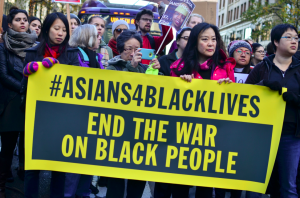Breath, life energy, the right to survive, the freedom to flourish and to dream of a better world.
The Department of Asian American Studies at the University of California, Santa Barbara, stands insolidarity with Black Lives Matter. We lift up Breonna Taylor, George Floyd, Tony McCade, David McAtee, and countless Black people whose lives were taken at the hands of the police.
We recognize that police killings are not only about individual bad actors, but about an entire system of violence and anti-Black oppression. We can draw a line from, in the words of Ruth Wilson Gilmore, the state sanctioned violence” of slave catchers, convict leasing, sharecropping, and segregation to today’s police violence against Black communities. We deplore the violence of poverty, disproportionate imprisonment, and the structural oppression that causes houselessness, unemployment, and health vulnerabilities, in addition to the killings of Black trans and cis women and men. Clyde Woods’s term of "asset stripping” adds another dimension to the oppression, where racism and capitalism not only create underdevelopment, but compound and magnify that impoverishment generation after generation. From slavery to Black Reconstruction to the present, anti-Black violence is seen in the state’s refusal to provide protections, while state apparatuses and White mobs actively destroyed the businesses, schools, churches, banks, institutions, communities, and lives that Black people struggled for and built.
As scholars of Asian American Studies, we recognize that we are intellectual inheritors of Black Studies and Black struggle. At San Francisco State college in 1968, the Black Student Union was instrumental informing the Third World Liberation Front that won the first school of ethnic studies in the nation. Activist scholars and students helped to launch the academic fields of Black, Indigenous, Chicana/o, Asian American Studies, and Feminist Studies. Generations of scholars in Black Studies have produced new ideas about race and resistance that have deeply shaped all of these fields. They still inform our work today.
Our field has witnessed and grappled with how Asians and Asian Americans have been used to erase Black protest and Black ways of knowing and being. We saw this in 1966, when popular news magazines promoted the “success stories” of Chinese and Japanese Americans, at the exact moment the Black freedom movement was turning to Black Power, self-determination, and raising questions of radical transformation. We see it again today and must adamantly reiterate Mari Matsuda’s warning that “We Will Not be Used.”
We stand in deep solidarity with Black liberation, with Black struggle, and against White supremacy. We believe in holding accountable all those who harm Black lives as well as all those who’ve given support to White supremacists. We recognize that anti-Blackness exists within Asian American communities. Our historical legacy is Yuri Kochiyama, Grace Lee Boggs, and the Asian American Political Alliance in support of the Black Panther Party and Free Huey campaigns, but it is also the Mike Masaokas and S.I.Hayakawas. It is today’s Asians for Black Lives activism, but it is also Tou Thao and Peter Liang. It is beyond time to end the state sanctioned violence in all its forms against Black communities in the United States and worldwide.
All lives won’t matter until Black lives matter.

